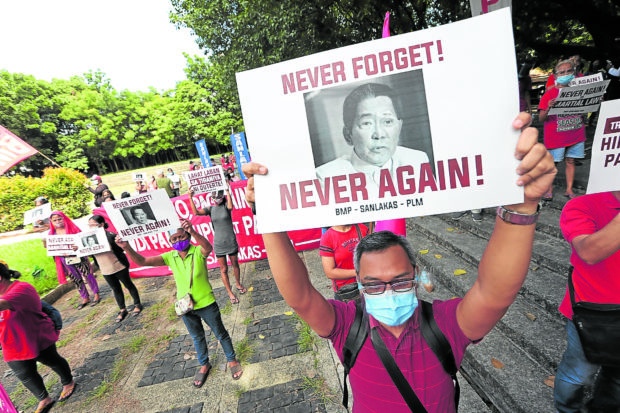
‘PUSHBACK AGAINST THE LIES’ Protesters gather on Monday at the Bantayog ng mga Bayani memorial for victims of human rights abuses to commemorate the 48th anniversary of the declaration of martial law. —NIÑO JESUS ORBETA
MANILA, Philippines — President Rodrigo Duterte has become a “globally infamous dictator” akin to the late strongman Ferdinand Marcos, an international coalition of human rights groups said on Monday, following a European Union (EU) Parliament’s resolution condemning the human rights situation in the Philippines.
Peter Murphy, chair of the International Coalition for Human Rights in the Philippines (ICHRP), said in a statement that the Duterte administration “has now gained notoriety as a world-[renowned] human rights violator, if not, a dictator following the likes of Ferdinand Marcos.”
Murphy cited the EU resolution that threatened to revoke the Philippines’ GSP+ trade privileges. “It is an attestation that the world no longer tolerates this repressive government. Duterte and his dictator government will be made accountable,” he said.
He added that “President Duterte, with his ‘de facto’ martial law in place and the continuing repression in the country, has found himself increasingly isolated in the international community. Cut from the same cloth as that of the late dictator Ferdinand Marcos, Duterte is now synonymous with killings and human rights atrocity.”
Human rights group Karapatan also affirmed the view that the country, on Duterte’s watch, was under “de facto martial law,” as it cited the illegal arrests of and false charges against activists, as well as threats to freedom of the press, such as the shutdown of ABS-CBN.
Killings, plunder
The Philippines commemorates this week the 48th anniversary of Marcos’ declaration of martial law, which was enforced at midnight of Sept. 23, 1972, and subsequently antedated to Sept. 21 in Proclamation No. 1081.
Under Marcos’ martial law regime, more than 3,000 people were killed, 34,000 were tortured, and 70,000 were imprisoned. Billions of dollars in public funds were also stolen by Marcos, his wife Imelda, and their cronies in business, politics and the police and military.
Imelda Marcos was convicted of graft in 2018, in connection with diverting funds in her various capacities under the Marcos regime. At the time, she was Metro Manila governor, assemblywoman in the Interim Batasang Pambansa, and head of the Ministry of Human Settlements.
Contrasts
Besides ICHRP and Karapatan, other critics point out similarities as well as differences between Marcos and Duterte, who has repeatedly expressed his admiration for Marcos and threatened as well to declare martial law nationwide.
In an online commemoration hosted by the University of the Philippines Diliman, activist Carol Pagaduan-Araullo said that while there were “several parallels” between Duterte and Marcos, “the only difference is that he is not so smart and competent in going about in establishing his dictatorship.”
“The Filipino people went through a period of struggle, and these lessons are imprinted in their minds, particularly among the older generation,” she said. “With some help, [I believe] the youth can learn more about this period in history.”
UP Baguio fine arts professor Liza Acevedo-Ilagan noted that Marcos, at least, was “conscious” of his international reputation. Duterte, however, was not.
The President’s “lack of finesse,” Ilagan said, has made certain aspects of his increasingly iron-fisted leadership “harder to contend with.”
“He does not even need to declare martial law formally,” she said. “We’re all just feeling it.”
Presidential spokesperson Harry Roque disputed the comparisons, saying “I grew up under martial law. There was no constitution, only a freedom constitution then. I can only say that the context is very different now. Before, Congress and the Supreme Court can be shut down.”
‘No debate’
Soon after declaring martial law, Marcos replaced the 1935 Constitution with the 1973 Constitution, which was ratified amid martial rule by citizens’ assemblies.
“Now, the President does not have that kind of power. The declaration of martial law can be questioned in Congress and in the courts. We have learned from our bitter experiences during martial law in the 1970s,” Roque said.
Vice President Leni Robredo on Monday urged the public to “push back against the lies” perpetuated about the Marcos dictatorship, warning that failing to do so would leave Filipinos “divided and vulnerable to abuse.”
In her statement, Robredo reminded Filipinos there was “no debate” about the late strongman’s legacy of killings, torture, disappearances and corruption.
She said “those who attempt to tell us otherwise are not only merely telling a supposed version of the story: They are lying to our faces, stealing our truths from us, stealing our stories.”
“Our task,” she said, “was to push back against these lies at every instant. To tell the stories of martial law and dictatorship over and over so that this generation, and the ones that come after, may be bound tighter through remembering.”
“To hold firm to the truth of this painful chapter of our history, and through this, forge the determination to never again let our people fall into such despair. We must do this because, ultimately, our national aspirations can only be as strong as our national memory,” Robredo said.
—With a report from Julie M. Aurelio